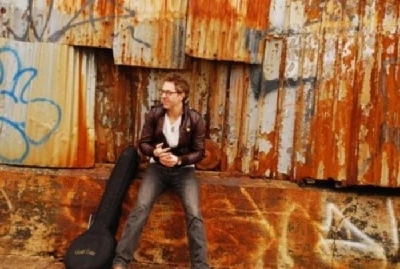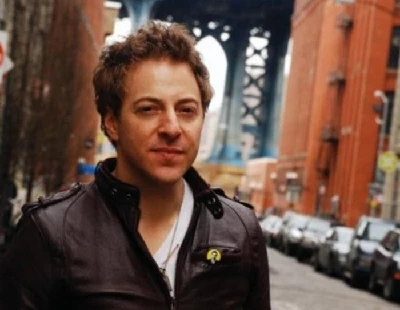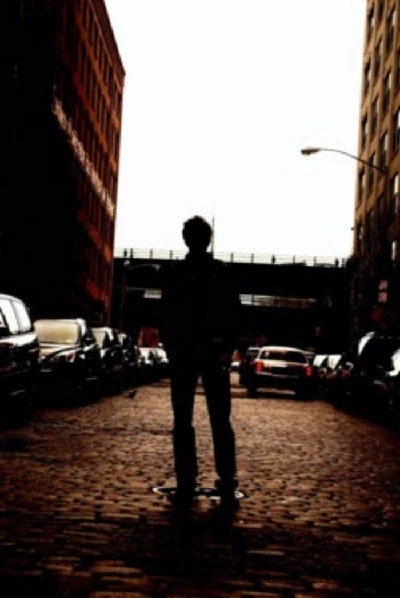published: 13 /
1 /
2010

New York-based singer-songwriter and instrumentalist Andrew Vladeck speaks to Lisa Torem about his new album 'The Wheel' and his contemporary upgrading of classic folk/blues music
Article
New York-based singer-songwriter and instrumentalist Andrew Vladeck will candidly admit that his songs don’t readily fit into a square box. He might boldly ask the question, “why a duct?” His synchronistic discovery of Pete Seeger- style music altered his consciousness. After all, he even shook hands with the folk icon.
Vladeck’s current release ‘The Wheel’ (End Up Records) overflows with keen observations and exciting performances. Vladeck’s vocals have been compared to Bruce Springsteen, but I hear astounding entrails of Bob Dylan and streamlined shadows of John Lennon, too. Vladeck doesn’t bristle at these comparisons, nor should he. He’s a self-contained master of dichotomies.
Imagine if the best of American folk music had been frozen in time. Then imagine if the fossilized remains had been excavated by a troubadour with a contemporary facelift. Imagine that this troubadour added his own unique vision of the current political climate, his own interpretations of urban squalor and once- kindred souls that had mournfully drifted apart.
What if the word play this troubadour manufactured cut through pretentiousness with deft wit? And that, at his bequest, every-day items, like crackers, became storied super-stars surrounded by stark strums?
Andrew Vladeck has a way with words, alright, and it’s a way that’s uniquely respectful to the human condition and irreverent to complacency, yet insanely believable.
Vladeck founded the indie folk quintet the Honey Brothers and also plays with another folk-based group Balthrop, who are from Alabama. He was the subject of a profile on BBC’s ‘The World’ and has been extolled in ‘The Deli Magazine’ when he was declared NYC Artist of the Month.
He has worked with Andrew Bird, Alejandro Escovedo, the Gourds and Beth Orton. His solo and band touring engagements have taken him extensively throughout America and Australia.
When I asked Vladeck about his five-year plan, he cleverly negotiated my question, whittling it down to one. Isn’t that what they call “trickle-down economics?” Or maybe it’s simply this songwriter’s strategy of allowing words to unravel and patch up the mysteries of life that most of us are still attempting to grip.
Vladeck shared personal impressions, facts and philosphies about ‘The Wheel’ with Pennyblackmusic.
PB: Let’s talk about the songs ‘Hold Me Back’ in which you use the phrase “patched up with duct tape” and ‘The Magnet’ which has the phrase ‘it’s hard and it’s tough, pieces to pick up.’ Is your philosophy of life based on things falling apart or coming back together?
AV: I think things tend to come unraveled if we’re not paying close enough attention to hold it together. But, it can be a lot of work, and who wouldn’t rather be watching the telly?
By the way, my brother is a mountaineer, and he always brings duct tape on expeditions because, as he says, “if it can’t be ducted, you’re fucked.”
PB: ‘The Songs You Inspire’ won first place in the International Songwriting Competition. Were you surprised that you won and how did this event move your career along?
AV: I was shocked. Shocked. Most fairly standard venues don’t understand my music – it’s either too folky to be rock or it’s too rocky to be folk, and never the twain shall meet. I give the judges credit for having an open mind with regards to genre and something that doesn’t fit in a square box. The laurels the award conferred definitely offers credibility to folks who don’t know me.
PB: What inspired you to select Kyle Fischer as your producer and how much input did you have in terms of production decisions?
AV: Kyle had seen me play a solo show at the Basement in Nashville. It was a tour in which I was trying out my material to record. Kyle came back stage after the show and it was more than clear that he “got” what I was going for.
We were on a similar page when it came to production which was great, and he had a lot of nice touches. We wanted to make a record that was song-centric, yet was orchestrated enough for a nice listening experience. We wanted to make a record that was simple and flexible enough for me to support on tour either solo or with a band.
PB: ‘Chinatown’ is set apart from the other tracks on ‘The Wheel’ in that it has an unusual sonar landscape. Was this an experiment?
AV: In many ways it was – we weren’t going to include it initially. I had tracked the song live and then one night Kyle went to town with his mildly hallucinogenic sonic visions.
PB: You use the banjo a lot on ‘The Wheel'. Why did you do that?
AV: I’m always craving something a little bit different sounding; something to catch my ear fresh. Adapting the banjo towards my own music style has been exciting since I had grown up playing old-time music, hillbilly style – it only occurred to me to try and adapt it into the noughties after a lightning strike, or after I hit my head on the subway doors.
PB: You met Pete Seeger. In your style, I hear some word play and instrumental technique that brings to mind folk singers of his day. Was he a major influence? Also, do your lyrics stem from literature or life?
AV: American Folk Music from the 1920s-60…hmm. Is saying, “it saved my life” too dramatic? Or is “it soothed my soul” too cliché? All I know is that I discovered it by accident, at a garage sale or something, and I had never heard it before – and at the time was drowning in contemporary pop music. And this music was so bare-bones, so direct, so honest and so earnest; it floored me.
My lyrics stem from life and from fantasy - plenty of day dreaming and poetic license is required.
PB: Formerly you were an Urban Park Ranger. Your press release states that you’re interested in the “interplay between nature and Gotham, and the edges where the two meet.” Could you elaborate on that? Do you feel that you’ve achieved that “interplay” after having recorded ‘The Wheel?’
AV: Well, there’s something amazing about walking on the edges of life…it’s kind of like walking on the beach – the edge between land and sea. It’s on that little edge of neither land nor sea – of wet/dry – that you find all the interesting bits from both places: whale bones, transistor radios, messages in bottles, mermaid teeth.
In my urban case it’s often where the wonder of nature gets confronted by the bluntness of the man made.
Like a mockingbird sitting on an antennae singing a car alarm song, it just slams you across the skull with a giant WTF It’s a mind-enlightenment. I think ‘The Wheel’ goes further in that direction than I’ve gone before, with the old/new thing, but I look forward to going much further in the future.
PB: You have a rambling narrative style that almost sounds like spoken word or even rap minus a percussive track. How did this come about?
AV: I love that you caught that. I never really noticed it myself until only recently. It’d been impossible before that to see what I do objectively. I guess my focus has first or foremost been on the story - the words. I grew up as rap was taking over, and there was nothing as remotely compelling. My appreciation of that seemed to Frankenstein with the love of old folk music. Scary.
PB: Your style of songwriting is distinct, yet I think it’s so powerful that comparisons to Dylan, Springsteen or other performers with intense bodies of work will be inevitable. How do you feel about that? Also, if compared with existing performers, can you explain how your style differs?
AV: To be mentioned in the same sentence as those people is an honour – I admire what they’ve written tremendously. Although I’m of a younger generation, I’ve traveled to drink from the same well as they – that gorgeous, dark brew of that old, weird America.
We’ve all taken its essence and tried to spin it as best we can through the worlds we inhabit, which are fairly different in terms of time and place and culture.
PB: Andrew, you played your way out of an Italian jail. Which song got you out?
AV: Okay, this is embarrassing…'We are the World'. One small step for world hunger, one large step for me out the door.
PB: Your last self-titled album came out in 2006. Why such a gap in time between releases?
AV: There was a lot of touring, there was a lot of family stuff, and there was an explosion in side projects. I’m very glad that the latter two have quieted down considerably so I can enjoy dong what I enjoy doing most.
PB: Final question. What’s the five-year plan?
AV: How about one year? Your question reminds me of a story in which someone asked Bob Dylan to play a song and Bob replied, “how about a verse?”
Write new songs, winter residency in NYC, random east coast dates, spring tour, record new EP, play Europe in the fall, record LP next winter, and, in the tons of time I don’t have, juggle other bands I love to play in such as the Honey Brothers, who will be touring a-plenty.
PB: Thank you.
Picture Gallery:-

